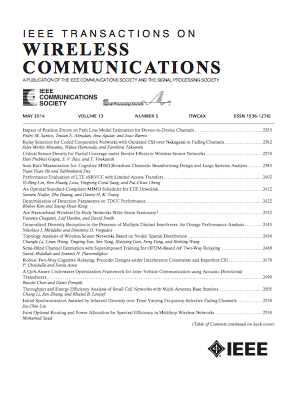无线网络上预训练基础模型的联邦微调
IF 10.7
1区 计算机科学
Q1 ENGINEERING, ELECTRICAL & ELECTRONIC
引用次数: 0
摘要
具有大量神经元的预训练基础模型(FMs)是推进下一代情报服务的关键,其中个性化这些模型需要大量特定任务的数据和计算资源。流行的解决方案涉及在边缘服务器上进行集中处理,然而,由于原始数据的传输,这会引起隐私问题。相反,联邦微调(FedFT)是一种新兴的隐私保护微调(FT)范例,适用于个性化的预训练基础模型。特别是,通过将低秩自适应(LoRA)与联邦学习(FL)集成,联邦LoRA实现了具有边缘设备的全局模型的协作FT,实现了与完整FT相当的学习性能,同时在分布式数据上训练更少的参数并保护原始数据隐私。然而,有限的无线资源和边缘设备的计算能力对在无线网络上部署3lora提出了重大挑战。在本文中,我们提出了一个分裂联邦LoRA框架,该框架将预训练模型的计算密集型编码器部署在边缘服务器上,而将嵌入模块和任务模块保留在边缘设备上。这些模块之间的信息交换通过无线网络进行。在此分离框架的基础上,对无线联邦LoRA系统的收敛间隙上界进行了严密的分析。该分析揭示了在所有回合中参与FedFT的边缘设备数量的加权影响,从而激发了长期上界最小化问题的制定。为了解决长期约束问题,我们使用Lyapunov技术将公式化的长期混合整数规划(MIP)问题分解为顺序子问题。然后,我们开发了一种有效的设备调度和带宽分配的在线算法。仿真结果证明了该算法在提高学习性能方面的有效性。本文章由计算机程序翻译,如有差异,请以英文原文为准。
Federated Fine-Tuning for Pre-Trained Foundation Models Over Wireless Networks
Pre-trained foundation models (FMs), with extensive number of neurons, are key to advancing next-generation intelligence services, where personalizing these models requires massive amount of task-specific data and computational resources. The prevalent solution involves centralized processing at the edge server, which, however, raises privacy concerns due to the transmission of raw data. Instead, federated fine-tuning (FedFT) is an emerging privacy-preserving fine-tuning (FT) paradigm for personalized pre-trained foundation models. In particular, by integrating low-rank adaptation (LoRA) with federated learning (FL), federated LoRA enables the collaborative FT of a global model with edge devices, achieving comparable learning performance to full FT while training fewer parameters over distributed data and preserving raw data privacy. However, the limited radio resources and computation capabilities of edge devices pose significant challenges for deploying 3 LoRA over wireless networks. To this paper, we propose a split federated LoRA framework, which deploys the computationally-intensive encoder of a pre-trained model at the edge server, while keeping the embedding and task modules at the edge devices. The information exchanges between these modules occur over wireless networks. Building on this split framework, the paper provides a rigorous analysis of the upper bound of the convergence gap for the wireless federated LoRA system. This analysis reveals the weighted impact of the number of edge devices participating in FedFT over all rounds, motivating the formulation of a long-term upper bound minimization problem. To address the long-term constraint, we decompose the formulated long-term mixed-integer programming (MIP) problem into sequential sub-problems using the Lyapunov technique. We then develop an online algorithm for effective device scheduling and bandwidth allocation. Simulation results demonstrate the effectiveness of the proposed online algorithm in enhancing learning performance.
求助全文
通过发布文献求助,成功后即可免费获取论文全文。
去求助
来源期刊
CiteScore
18.60
自引率
10.60%
发文量
708
审稿时长
5.6 months
期刊介绍:
The IEEE Transactions on Wireless Communications is a prestigious publication that showcases cutting-edge advancements in wireless communications. It welcomes both theoretical and practical contributions in various areas. The scope of the Transactions encompasses a wide range of topics, including modulation and coding, detection and estimation, propagation and channel characterization, and diversity techniques. The journal also emphasizes the physical and link layer communication aspects of network architectures and protocols.
The journal is open to papers on specific topics or non-traditional topics related to specific application areas. This includes simulation tools and methodologies, orthogonal frequency division multiplexing, MIMO systems, and wireless over optical technologies.
Overall, the IEEE Transactions on Wireless Communications serves as a platform for high-quality manuscripts that push the boundaries of wireless communications and contribute to advancements in the field.

 求助内容:
求助内容: 应助结果提醒方式:
应助结果提醒方式:


